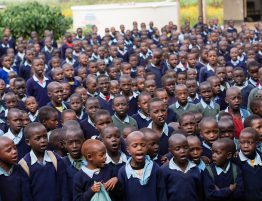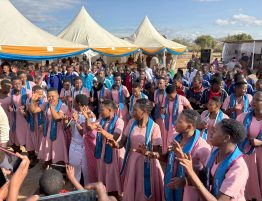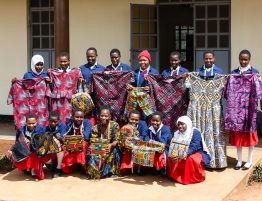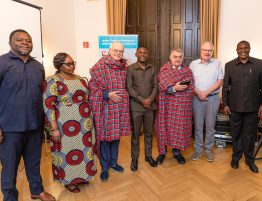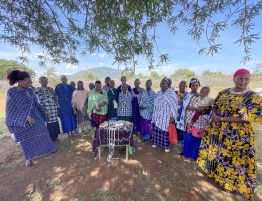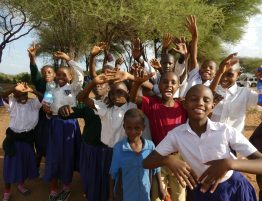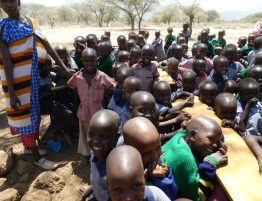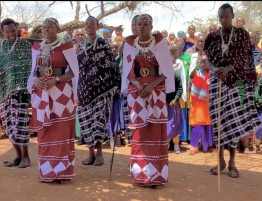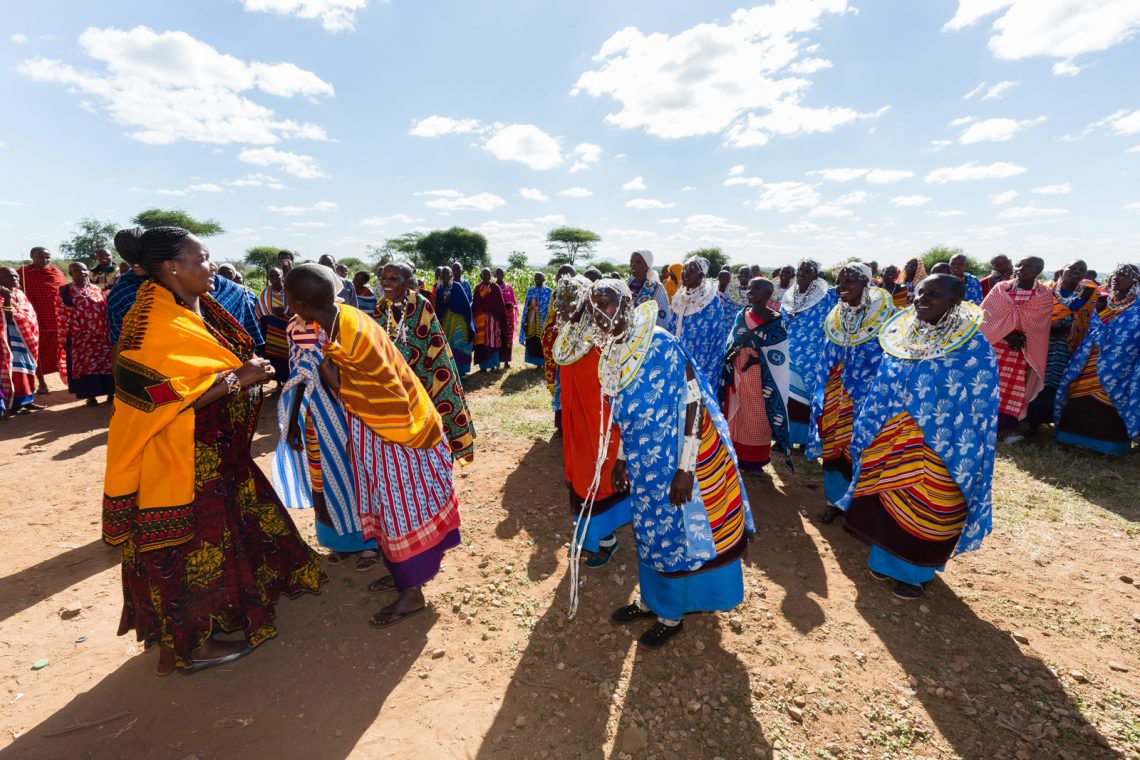
Last year, despite the Corona pandemic, we were able to implement all our projects in Tansania as planned. In this newsletter we report mainly on the school and education projects. ECLAT’s work with women is only briefly touched upon, but will be the main topic in the next newsletter. We also report briefly on the progress of the elephant corridor at the Ngorongoro Crater and the PAULA water project in Sukuro.
New primary school in Emboreet: Things are moving forward
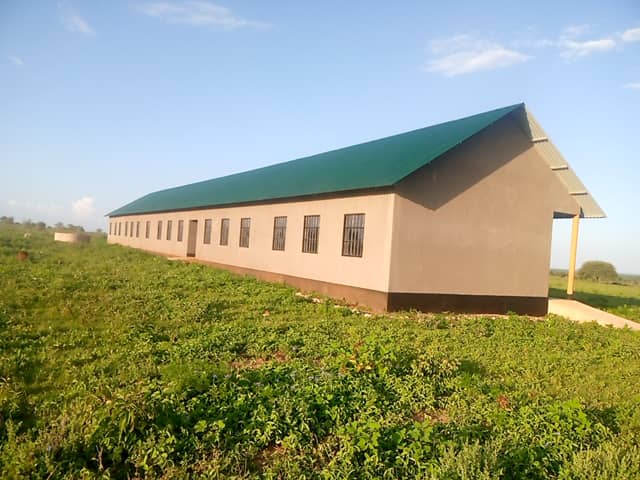
Block with 5 new classrooms at the new primary school in Emboreet
At the beginning of 2020, the magazine Chrismon reported in an article by Claudio Verbano about an 8-year-old schoolgirl who has to walk many hours a day from her home to school and back. Following the decision of upendo to build a new school near the girl`s boma, Chrismon launched a fundraising appeal for the construction of this school in May. The response to this was so great that we were able to construct significantly more buildings than initially planned. In September, ECLAT was able to hand over the new Lenaitunyo Primary School in Emboreet to the local authorities responsible for running the school. Since then, children living in the vicinity of the school have been taught there. Before, most of them had to walk many kilometres to school every day, if they attended school at all. In January, 150 school beginners started their lessons here. upendo has received further donations for the construction of the school even after September, so that we will be able to build another residential building for teachers there in these weeks. This means that more teachers can be assigned to the school who would otherwise not be able to find a place to live far and wide.
Other school projects
In addition to the extension at this school, we have also been able to start new construction and renovation work at other primary schools in recent months, namely in Bonde la Faru, Engorika, Kampuni (2nd phase), Mazinde (2nd phase), Olalaa and Sukuro. And of course, the expansion of the secondary school in Emboreet continues: we are happy that we will be able to complete the construction of this school by the end of this year.
Expansion of the Craft Centre
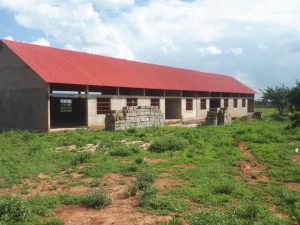
The two workshops at the crafts centre are almost finished
In the last few months, intensive construction work has been done on the Craft Centre, especially on the new workshop halls. These are also of central importance for a handicraft training centre in Tanzania and must also be adequately expanded and equipped in Tanzania. As early as July, carpenters and locksmiths, boys and girls, are to be trained there in addition to the existing bricklaying apprentices. Until now, young people who could not qualify for an academic education at school have not had the chance to learn a trade in the district. But now they can learn something instead of trying their luck in the big cities of the country or going back to their villages to herd cattle, sheep and goats like their forefathers and start families at a young age. Instead, they can settle in the district and contribute to the economic development of their homeland. Besides the extensive construction work and the purchase of tools and machines, the intensive preparation of the vocational training based on the German dual training scheme in coordination with VETA is also part of the project. (VETA is the Tanzanian government agency responsible for craft training in the country and will operate the centre).
ECLAT’s work with women
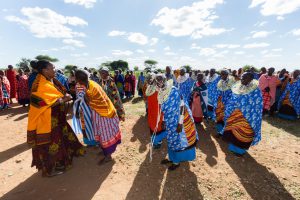
Reception by Philomena for the visit of a women’s group
ECLAT has been trying to strengthen the role of women in Maasai culture for many years. Philomena founded and leads this work. This includes the supervision of 75 women’s groups in the villages of the district. The groups are visited by ECLAT staff in the villages to exchange experiences and to provide advice on problems. Almost all groups have now received a micro-credit with the aim of learning how to to run their own businesses. Many of them find it difficult to suddenly have money of their own and to manage it successfully. Some have economic success, others are hardly successful at all.
For more than three years, one of the women’s groups has been meeting every week at the ECLAT Women’s Work Seminar Centre to undergo intensive training from the two teachers and to reflect together on the group and its success or failure. This is not an easy task either, considering that hardly any of the women have ever been sitting on a school bench to learn reading and maths.
Elephant corridor at the Ngorongoro Crater
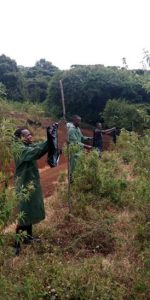
Cloths dipped in chili broth are hung up to protect fields from elephants
We were also able to continue our project with the PAMS Foundation to protect the elephant corridor in the Ngorongoro Crater last year. The elephants in the crater migrate along centuries-old routes out of the crater to other national parks. However, due to the strong growth of the Tanzanian population, more and more people are looking for opportunities to plant new fields. This easily leads to dangerous encounters with wild animals: many Tanzanians are killed every year. But elephants also like to forage in fields that are ripe for harvesting, so that people suffer from hunger. A protective fence along the corridor now keeps the elephants in the corridor. The “fence” consists of cloths dipped in chilli broth. The elephants’ sense of smell is highly sensitive; the animals stay away from the fence and do not ravage the farmers’ fields or enter the villages. So the farmers learn to protect both themselves and their fields and to live with the wild animals. Only then are they understandably prepared to accept the idea of a national park and the existence of wild animals.
PAULA Wasserfiltrationsanlage in Sukuro
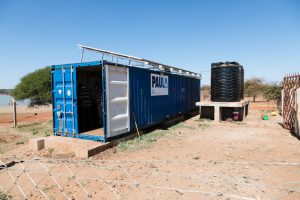
Polluted seawater is filtered in the PAULA container to make hygienic drinking water
For four years now, the population in Sukuro has been receiving hygienically clean drinking water, which is taken from the polluted and germ-laden reservoir and filtered through membranes in the PAULA container. In the meantime, the population has become accustomed to paying a small amount for clean water. And the water committee of the village has learned to run the plant reliably and to pay staff and buy spare parts and consumables with the money collected. ECLAT only needs to “look after things” from time to time or look for solutions to major technical problems. In cooperation with PAULA Water Ltd, a second such plant is currently being built in the village of Narakauo.
Photos: Bakiri Angalia 2021 (1,2), Rüdiger Fessel 2016/2017 (3,5), PAMS Foundation 2020 (4)

